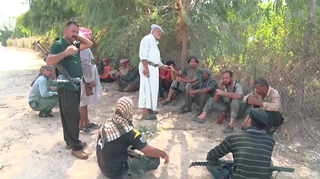 W
WThe European migrant crisis, also known as the refugee crisis, was a period characterised by high numbers of people arriving in the European Union (EU) overseas from across the Mediterranean Sea or overland through Southeast Europe. In March 2019, the European Commission declared the migrant crisis to be at an end, although displaced people continued to arrive.
 W
WThe Occupation of Iraq is characterized by a large United States military deployment on Iraqi territory, beginning with the U.S.-led invasion of the country in March 2003 which overthrew the Ba'ath Party government of Saddam Hussein and ending with the departure of US troops from the country in 2011. Troops for the invasion came primarily from the United States, the United Kingdom and Poland, but 29 other nations also provided some troops, and there were varying levels of assistance from Japan and other countries.
 W
WThe Iraq War was a protracted armed conflict that began in 2003 with the invasion of Iraq by a United States-led coalition that overthrew the government of Saddam Hussein. The conflict continued for much of the next decade as an insurgency emerged to oppose the occupying forces and the post-invasion Iraqi government. An estimated 151,000 to 1,033,000 Iraqis were killed in the first three to four years of conflict. US troops were officially withdrawn in 2011. However, following the spread of the Syrian Civil War and the territorial gains of the Islamic State of Iraq and the Levant (ISIL), the Obama administration decided to redeploy US forces to Iraq in 2014. Many former soldiers are employed by defense contractors and private military companies. The U.S. became re-involved in 2014 at the head of a new coalition; the insurgency and many dimensions of the civil armed conflict continue. The invasion occurred as part of the George W. Bush administration's War on Terror, following the September 11 attacks.
 W
WThe Iraqi conflict is a long-running armed conflict that began with the 2003 invasion of Iraq by a United States-led coalition that toppled the government of Saddam Hussein. The conflict continued as an insurgency emerged to oppose the occupying forces and the post-invasion Iraqi government. The United States officially withdrew from the country in 2011, but became re-involved in 2014 at the head of a new coalition. The conflict is still ongoing as a low-level insurgency.
 W
WAn insurgency began in Iraq after the 2003 US-led invasion, and lasted throughout the ensuing Iraq War which lasted from 2003 until 2011. The first phase of the insurgency began shortly after the 2003 invasion and prior to the establishment of the new Iraqi government. From around 2004 to May 2007, the insurgency primarily targeted the Multi-National Force – Iraq, while latterly Iraqi security forces, seen by Iraqi insurgents as collaborators with the coalition, were also targeted.
 W
WThe ISIL insurgency in Iraq is an ongoing low-intensity insurgency that began in late 2017 after the Islamic State of Iraq and the Levant (ISIL) lost territorial control in the Iraqi Civil War (2014–2017). Several rebel groups, including ISIL, White Flags and the Iraqi Baath Party fought the Iraqi military and allied paramilitary forces.
 W
WThe Iraqi insurgency was an insurgency that began in late 2011 after the end of the Iraq War and the withdrawal of U.S. troops from Iraq, resulting in violent conflict with the central government, as well as low-level sectarian violence among Iraq's religious groups.